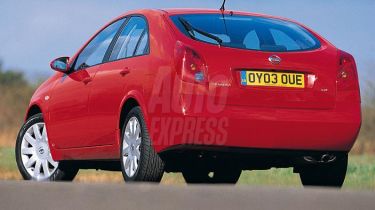Nissan Primera 2.2 dCi
Most car builders like to keep quiet about platform sharing. No one boasts about the fact that an Audi TT sits on the same chassis as VW's Golf, or that the new Chrysler Crossfire is almost entirely built of bits of Mercedes' SLK.
Good news for diesel fans - Nissan's revised 2.2-litre dCi Primera is better than the previous oil-burner. However, a word of caution, as the changes made to the engine are not as extreme as the new title suggests. Ultimately, though, the car is a great motorway mile-muncher - despite disappointing 36mpg economy.
Most car builders like to keep quiet about platform sharing. No one boasts about the fact that an Audi TT sits on the same chassis as VW's Golf, or that the new Chrysler Crossfire is almost entirely built of bits of Mercedes' SLK.
Which is exactly why the latest version of Nissan's daringly styled Primera is such a surprise. Powered by a revised 136bhp 2.2-litre diesel, it wears sister firm Renault's dCi badge in celebration of the companies' technical partnership. The car is priced from £15,600, but we tried out the well equipped SVE costing £18,000.
It is generously equipped, and sports a spacious and attractive interior. Yet it's under the bonnet where the major work has been going on. And despite the dCi title, the engine has nothing to do with Renault. It's actually a mildly tweaked 2.2 turbodiesel that has been offered in the Primera since launch. Increased competition from rivals such as Ford's 130bhp Mondeo TDCi and the 116bhp Toyota Avensis D4-D meant Nissan felt it had to respond. And thank goodness it did - the old 124bhp diesel was both slow and noisy.
Used - available now

2023 Peugeot
208
16,998 milesAutomaticPetrol1.2L
Cash £14,755Refined
The new unit, coupled with a slick six-speed box, is not only punchier, but also more refined. Sprinting from 0-60mph in only 9.8 seconds, it can keep up with class leaders, although the engine seemed short of puff above 4,000rpm.
Despite having a common-rail fuel arrangement, the four-cylinder unit is not as economical as we expected, returning a less-than-impressive 36mpg while in our hands. Officially, the figure is claimed to be closer to 46mpg.
More pleasing was the car's motorway performance. At a steady cruising speed, the Primera felt relaxing and secure. The gearbox ratios are well spaced, and thanks to a comparatively long sixth, engine speeds are kept low - helping reduce noise and vibration without spoiling throttle response.
Come off the motorway, however, and things take a turn for the worse. The motor feels heavy, and the suspension is overwhelmed by rapid changes in camber and surface. There's a fair amount of road noise, too, and bigger bumps are translated through the cabin with shuddering thumps. It's unlikely to worry most Nissan customers, but is disappointing all the same.
Thankfully, steering and brakes remain relatively sharp, so as long as you can put up with the ride quality, there's still fun to be had. It's simply that this Nissan is not quite as finely polished as its recently launched rivals.
However, all that looks set to change very soon. In badging its cars dCi, the Japanese firm is sending out a clear message that Renault will be much more involved in its diesels in the future.



